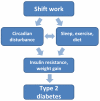Shift work as a risk factor for future type 2 diabetes: evidence, mechanisms, implications, and future research directions
- PMID: 22162952
- PMCID: PMC3232187
- DOI: 10.1371/journal.pmed.1001138
Shift work as a risk factor for future type 2 diabetes: evidence, mechanisms, implications, and future research directions
Abstract
Mika Kivimaki and colleagues discuss new research that shows an association between shift work and the risk of developing type 2 diabetes among nurses.
Conflict of interest statement
The authors have declared that no competing interests exist.
Figures
Comment on
-
Rotating night shift work and risk of type 2 diabetes: two prospective cohort studies in women.PLoS Med. 2011 Dec;8(12):e1001141. doi: 10.1371/journal.pmed.1001141. Epub 2011 Dec 6. PLoS Med. 2011. PMID: 22162955 Free PMC article.
References
-
- Pan A, Schernhammer ES, Sun Q, Hu FB. Rotating night shift work and risk of type 2 diabetes: two prospective cohort studies in women. PLoS Med. 2011;9:e1001141. doi: 10.1371/journal.pmed.1001141. - DOI - PMC - PubMed
-
- Froy O. Metabolism and circadian rhythms--implications for obesity. Endocr Rev. 2010;31:1–24. - PubMed
-
- Van Cauter E. Sleep disturbances and insulin resistance. Diabet Med. 2011. E-pub ahead of print 26 September 2011. doi: 10.1111/j.1464-5491.2011.03459.x. - DOI - PubMed
-
- Spiegel K, Tasali E, Penev P, Van Cauter E. Brief communication: Sleep curtailment in healthy young men is associated with decreased leptin levels, elevated ghrelin levels, and increased hunger and appetite. Ann Intern Med. 2004;141:846–850. - PubMed
Publication types
MeSH terms
Grants and funding
LinkOut - more resources
Full Text Sources
Medical


